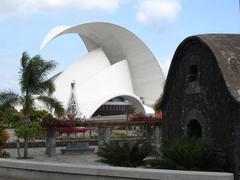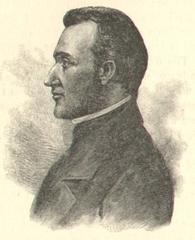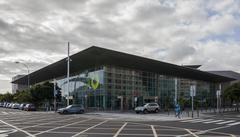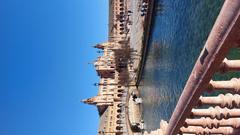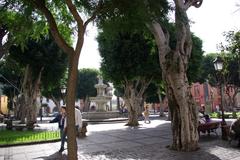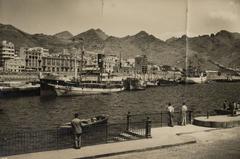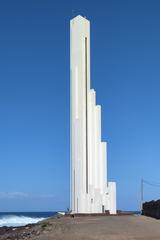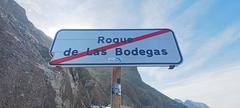Sol Rojo Visiting Hours, Tickets, and Travel Guide for Santa Cruz de Tenerife
Date: 14/06/2025
Introduction
Sol Rojo, an iconic abstract sculpture by Colombian artist Édgar Negret, stands as a testament to Santa Cruz de Tenerife’s commitment to cultural innovation and the integration of contemporary art into its urban fabric. Originally commissioned as part of a broader initiative to enrich public spaces, Sol Rojo’s bold design, vibrant color, and symbolic reference to the sun reflect both local identity and international modernist traditions. Following its recent restoration and relocation to the sheltered Parque de La Granja, the sculpture now enjoys renewed prominence as a cultural landmark and a beacon for art lovers, residents, and travelers alike (Wikipedia: Édgar Negret, Santa Cruz de Tenerife: A Vibrant Metropolis).
This comprehensive guide covers Sol Rojo’s history, artistic significance, practical visitor information—including hours, accessibility, and directions—nearby attractions, and insights into its restoration and ongoing preservation. Whether you are seeking a cultural highlight for your Tenerife itinerary or a deeper understanding of the city’s public art, this article offers all you need to make the most of your visit (Official Santa Cruz Tourism Website).
Table of Contents
- The Origins and Commissioning of Sol Rojo
- Édgar Negret: Artistic Trajectory and Influence
- Abstract Sculpture, Constructivism, and Sol Rojo’s Context
- Symbolism and Cultural Significance
- Integration into Santa Cruz’s Urban Landscape
- Restoration and Relocation: Preserving Sol Rojo
- Visiting Sol Rojo: Hours, Accessibility, and Travel Tips
- Preservation and Community Engagement
- Frequently Asked Questions (FAQs)
- References
The Origins and Commissioning of Sol Rojo
Sol Rojo (“Red Sun”) was created by Édgar Negret, a leading figure in Latin American abstract sculpture, as part of Santa Cruz de Tenerife’s drive to enhance its public spaces with contemporary art. The work was installed during a period of urban renewal, reflecting the city’s ambition to blend historical heritage with modern cultural vibrancy (Wikipedia: Édgar Negret). The sculpture’s geometric design and industrial materials embody the optimism and dynamism of the era, while its reference to the sun resonates with the Canary Islands’ identity as a crossroads of cultures.
Édgar Negret: Artistic Trajectory and Influence
Born in Colombia in 1920, Édgar Negret was celebrated for his mastery of abstract forms and innovative use of metal. After early influences from European modernists, Negret embraced the constructivist tradition and became internationally recognized, with works acquired by major museums and honors including the David E. Bright Sculpture Prize at the Venice Biennale (Wikipedia: Édgar Negret). His sculptures, typified by modular constructions, vibrant colors, and interplay with light, are exemplified by Sol Rojo.
Abstract Sculpture, Constructivism, and Sol Rojo’s Context
Sol Rojo is rooted in the abstract and constructivist movements that shaped mid-20th-century art across Latin America and Europe. Characterized by geometric forms, painted aluminum, and visible industrial joints, the sculpture synthesizes organic inspiration with mechanical technique—a hallmark of Negret’s mature style. Its bold red color and circular motif evoke energy and renewal, while its presence in Santa Cruz aligns the city with international trends in public art.
Symbolism and Cultural Significance
The sun, central to Sol Rojo’s conception, represents life, vitality, and continuity. For Santa Cruz de Tenerife, the sculpture serves as a bridge between local traditions and the global language of modernism. Its radiant form invites interpretation and reflection, embodying both the natural energy of the islands and the city’s aspirations as a cultural hub (Santa Cruz de Tenerife: A Vibrant Metropolis).
Integration into Santa Cruz’s Urban Landscape
Sol Rojo is emblematic of Santa Cruz’s strategy to revitalize public spaces through art. The sculpture interacts visually with its surroundings, contrasting with the city’s blue skies and greenery, and serves as a reference point for locals and visitors. Its location in Parque de La Granja—following its relocation from the harsher seaside environment—ensures preservation while enhancing accessibility and public enjoyment (Santa Cruz de Tenerife: The Complete Guide).
Restoration and Relocation: Preserving Sol Rojo
Condition Prior to Restoration
By 2024, Sol Rojo had suffered significant deterioration due to prolonged exposure to sun and sea air in its original site near Parque Marítimo César Manrique. The red paint had faded, the aluminum surface showed damage, and the structure required stabilization (eldigitalsur.com).
The Restoration Process
Commissioned by the Ayuntamiento de Santa Cruz and overseen by cultural heritage authorities, the restoration involved:
- Removing old paint and surface corrosion
- Sandblasting and priming for better paint adhesion
- Repairing and reinforcing joints and rivets
- Repainting with Negret’s signature red color
- Installing a new concrete base to protect against ground moisture
The project cost €12,500.76, including the sculpture’s restoration and its new base (canal4tenerife.tv).
The Relocation to Parque de La Granja
To better protect the sculpture, Sol Rojo was relocated to Parque de La Granja—a green, sheltered setting ideal for both preservation and public appreciation. The move shields the artwork from harsh environmental elements and situates it within a well-frequented park, furthering its role as a community landmark (canal4tenerife.tv).
Visiting Sol Rojo: Hours, Accessibility, and Travel Tips
Visiting Hours and Admission
Sol Rojo is freely accessible within Parque de La Granja, open daily from 7:00 AM to 10:00 PM. No tickets or reservations are required.
Accessibility and Visitor Amenities
The park features paved, wheelchair-friendly paths, clear signage, and nearby public transport stops. Restrooms, picnic areas, and shaded seating are available. The area is safe, family-friendly, and LGBTQ+ welcoming (Santa Cruz Cultural Heritage).
Directions and Best Time to Visit
Located centrally, Parque de La Granja can be reached by bus, taxi, or on foot from Santa Cruz’s city center. Parking is available nearby. Early mornings and late afternoons are ideal for capturing the sculpture’s vibrant color in natural light, while weekdays are quieter for contemplation.
Nearby Historical and Cultural Sites
Enhance your visit by exploring:
- Plaza de España: The city’s principal square with historical monuments
- Museum of Nature and Archaeology: Showcasing Tenerife’s natural and cultural heritage
- Garcia Sanabria Park: An urban park with botanical gardens and additional sculptures
- Auditorio de Tenerife: A modern architectural marvel by Santiago Calatrava
(Official Santa Cruz Tourism Website)
Guided Tours and Special Events
Santa Cruz occasionally offers public art walking tours and cultural events that feature Sol Rojo. For schedules, check with the official tourism office or local visitor centers.
Preservation and Community Engagement
Santa Cruz’s cultural authorities conduct regular inspections and maintenance to ensure the longevity of Sol Rojo and other public artworks. Citizens are encouraged to respect and help protect these cultural assets, with educational programs and interpretive signage fostering community pride and engagement (diariodeavisos.elespanol.com, Santa Cruz Cultural Heritage).
Frequently Asked Questions (FAQs)
Q: What are the visiting hours for Sol Rojo?
A: Sol Rojo is accessible in Parque de La Granja from 7:00 AM to 10:00 PM daily.
Q: Is there an entrance fee or do I need tickets?
A: No, the sculpture is free to visit and requires no tickets.
Q: Is Sol Rojo accessible for people with disabilities?
A: Yes, the park has paved, wheelchair-accessible paths.
Q: Are guided tours available?
A: Guided public art tours are occasionally offered; check with the local tourism office.
Q: Can I take photographs?
A: Photography is welcome; early morning and late afternoon provide the best natural light.
Q: Are there any restrictions?
A: Please do not climb on the sculpture, and note that drones are not permitted in the park.
References
- Wikipedia: Édgar Negret
- Sol Rojo restored and relocated in Santa Cruz de Tenerife, El Digital Sur
- Sol Rojo restoration details and relocation, Canal 4 Tenerife
- Santa Cruz de Tenerife: A Vibrant Metropolis, Tenerife Canary Islands
- Official Santa Cruz de Tenerife Tourism Website, Web Tenerife
- Preservation of Public Art in Santa Cruz, Diario de Avisos
- Santa Cruz Cultural Heritage Services, Ayuntamiento de Santa Cruz de Tenerife
Conclusion
Sol Rojo stands as a radiant symbol of Santa Cruz de Tenerife’s dedication to art, cultural heritage, and urban renewal. Its journey—from creation and installation to restoration and thoughtful relocation—embodies the city’s commitment to preserving its public art treasures for generations to come. With year-round free access, excellent accessibility, and its setting amid other historical and cultural landmarks, Sol Rojo is a must-see for anyone wishing to explore the vibrant heart of Tenerife.
For the latest updates, guided tour information, and interactive resources, visit the official tourism website or download the Audiala app. Experience the interplay of art, history, and community that defines Santa Cruz de Tenerife—starting with the enduring legacy of Sol Rojo.
